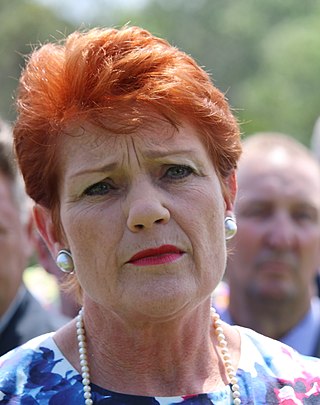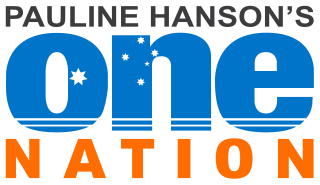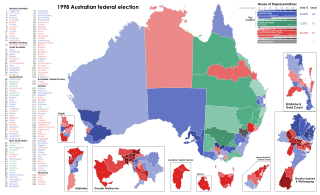
Pauline Lee Hanson is an Australian politician who is the founder and leader of One Nation, a right-wing populist political party. Hanson has represented Queensland in the Australian Senate since the 2016 Federal Election.

Pauline Hanson's One Nation, also known as One Nation or One Nation Party, is a right-wing populist political party in Australia. It is led by Pauline Hanson.
David Ernest Oldfield is an Australian former politician who co-founded and was national director of the Pauline Hanson's One Nation party.

The 1998 Australian federal election was held to determine the members of the 39th Parliament of Australia. It was held on 3 October 1998. All 148 seats of the House of Representatives and 40 seats of the 76-seat Senate were up for election. The incumbent centre-right Liberal/National Coalition government led by Prime Minister John Howard of the Liberal Party and coalition partner Tim Fischer of the National Party defeated the centre-left Australian Labor Party opposition led by Opposition Leader Kim Beazley, despite losing the nationwide popular and two-party preferred vote. However, the Australian Labor Party gained seats from the previous election.

Strathfield is an electoral district of the Legislative Assembly in the Australian state of New South Wales. Since a by-election in 2022, it has been represented by Jason Yat-Sen Li of the Labor Party. It was first created in 1988 and derives its name from the suburb of the same name.

The Shooters, Fishers and Farmers Party (SFF) is a conservative Australian political party. It primarily advocates for increased funding and services for rural and regional Australia, protecting the right to farm, enhancing commercial and recreational fishing, tougher sentencing for illegal firearm trade and usage, and relaxing gun control for law abiding citizens.
Peter Hon Jung Wong is a Chinese-born Australian politician. A figure in the Sydney Chinese community and former member of the Liberal Party of Australia, he became concerned over the Liberal Party's refusal to oppose strongly the rise of Pauline Hanson and her One Nation Party, and ultimately went on to found the Unity Party. He served as their leader from 1998 to 1999 and represented the party in the New South Wales Legislative Council from March 1999 until March 2007. Wong was made a Member of the Order of Australia in 1996.

Cabramatta is an electoral district of the Legislative Assembly in the Australian state of New South Wales. It is currently represented by Tri Vo of the Labor Party.

The 2007 New South Wales state election was held on Saturday, 24 March 2007. The entire Legislative Assembly and half of the Legislative Council was up for election. The Labor Party led by Morris Iemma won a fourth four-year term against the Liberal-National coalition led by Peter Debnam.

The 2003 New South Wales state election was held on Saturday 22 March 2003. All seats in the Legislative Assembly and half the seats in the Legislative Council were up for election. The Labor Party led by Bob Carr won a third four-year term against the Liberal–National Coalition led by John Brogden.

The 1999 New South Wales state election was held on Saturday, 27 March. All seats in the New South Wales Legislative Assembly and half the seats in the New South Wales Legislative Council was up for election. The Incumbent New South Wales Premier Bob Carr won a second term with a 7% swing of vote against the Liberal National Party led by Kerry Chikarovski. The poll was the first to be held after two key changes to the electoral system. In 1997, the number of electoral districts was reduced from 99 to 93. In 1995, fixed four-year terms were introduced. As of 2023, this is the most recent NSW election in which the leader of the winning party would complete a full term as premier.
One Nation NSW was a minor Australian political party that operated exclusively in the state of New South Wales (NSW) from 2000 to 2007. The party was a splinter group of Pauline Hanson’s One Nation (PHON).

The Non-Custodial Parents Party was a minor political party in Australia registered between 1999 and 2020. It supported less government control of many aspects of daily family life, focusing on reform of family law and child support.

In Australia, how-to-vote cards (HTV) are small leaflets that are handed out by party supporters during elections. Voting in the Australian lower house uses a preferential voting system. Voters must rank every candidate on the ballot in order for their vote to count. There are often numerous candidates on the ballot, some with little public profile, so voters may find it difficult to decide on all of them. Parties produce how-to-vote cards ostensibly to help voters. They contain details about the candidate or party as well as instruction how to cast a ranked vote in the order that the party would prefer the voter follow. The flow of preferences can assist the party dispersing the cards directly and indirectly help allied parties.

Jeremy Nova Buckingham is an Australian politician. He was a member of the New South Wales Legislative Council from 2011 to 2019, representing the Greens from 2011 to 2018, but resigned from the party on 20 December 2018. He was unsuccessful in retaining his place at the 2019 state election, but won a seat in the Legislative Council at the 2023 state election, representing the Legalise Cannabis Party.
Ernest Kwok Chung Wong is a Hong Kong-born Australian politician who was an Australian Labor Party member of the New South Wales Legislative Council from 2013 to 2019.

The 2017 Queensland state election was held on 25 November 2017 to elect all 93 members of the Legislative Assembly of Queensland, the unicameral Parliament of Queensland.

The 2019 New South Wales state election was held on Saturday 23 March 2019 to elect the 57th Parliament of New South Wales, including all 93 seats in the Legislative Assembly and 21 of the 42 seats in the Legislative Council. The election was conducted by the New South Wales Electoral Commission (NSWEC).
Members of the New South Wales Legislative Assembly who served in the 57th Parliament hold their seats from 2019 to 2023. They were elected at the 2019 state election on 23 March 2019. The Speaker was Shelley Hancock until May 2019 and then Jonathan O'Dea.
Jason Yat-Sen Li is an Australian businessman and politician. He is a member of the Australian Labor Party (ALP) and was elected to the New South Wales Legislative Assembly at the 2022 Strathfield state by-election.













